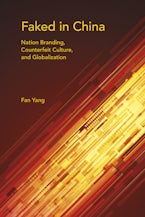- Home
- Framing the Global
- Faked in China
Preparing your PDF for download...
There was a problem with your download, please contact the server administrator.
Faked in China
Nation Branding, Counterfeit Culture, and Globalization
by Fan Yang
Published by: Indiana University Press
298 Pages, 7 b&w illus.
- eBook
- 9780253018526
- Published: November 2015
$9.99
Other Retailers:
Faked in China is a critical account of the cultural challenge faced by China following its accession to the World Trade Organization in 2001. It traces the interactions between nation branding and counterfeit culture, two manifestations of the globalizing Intellectual Property Rights (IPR) regime that give rise to competing visions for the nation. Nation branding is a state-sanctioned policy, captured by the slogan "From Made in China to Created in China," which aims to transform China from a manufacturer of foreign goods into a nation that creates its own IPR-eligible brands. Counterfeit culture is the transnational making, selling, and buying of unauthorized products. This cultural dilemma of the postsocialist state demonstrates the unequal relations of power that persist in contemporary globalization.
Acknowledgments
List of Frequently Used Translations and Transliterations
List of Abbreviations
Introduction
1. "From Made in China to Created in China": Nation Branding and the Global-National Imaginary
2. From Bandit Cell Phones to Branding the Nation: Three Moments of Shanzhai
3. Crazy Stone, National Cinema, and Counterfeit (Film) Culture
4. Landmark, Trademark, and Intellectual Property at Beijing's Silk Street Market
Conclusion: Cultural Imperialism and the "Chinese Dream"
Appendix 1. Crazy Stone Synopsis
Appendix 2. The Opening (Copied) Sequence in Crazy Stone
Appendix 3. Silk Alley Synopsis
Notes
Bibliography
Index
Fan Yang is Assistant Professor in the Department of Media and Communication Studies at the University of Maryland, Baltimore County.
"
Fan Yang has written a thoughtful and accessible study of the counterfeit culture of China, specifically probing intellectual property rights (IPR) in terms of regime, culture, and power.
" ~Pacific Affairs
"
[A] timely work to address key concerns regarding China's engagement with globalisation through the lens of intellectual property rights (IPR), which is commonly known as an economic and legal regime but revisited as a cultural one in the book.
" ~Critical Arts
"
Scholars interested in the workings of globalization and cultural imperialism will find a great deal of value in Yang's thoughtful and detailed account.
" ~Communication and the Public
"An intricate picture of the cultural politics and transnational power struggles in World Trade Organization-era China."
~Global Media and Communication
"Fan Yang has written an unusual book. Faked in China succeeds in doing something that is very difficult: it shifts the terms of the debate by offering a new perspective on IPR. . . will certainly stimulate much discussion about the future of both IPR and the project of reimagining the Chinese nation."
~The China Journal
"Faked in China is an outstanding and highly original work. I am sure it will become required reading in cultural studies disciplines as well as in media and communcations studies."
~The China Quarterly
"The author succeeds in the central effort of using real-life examples to demonstrate that counterfeiting in today's China has a cultural meaning and impact beyond its purely economic and productive facets."
~Asian Affairs
"[A]n original, interdisciplinary, superbly well researched analysis of the PRC under the gun of the global, modern, and Eurocentric 'IPR regime.' . . . [O]ffers an alternative and to me very compelling way to do cultural studies, bringing the question of culture into relation with the state and nation under globalization."
~Daniel Vukovich, author of China and Orientalism: Western Knowledge Production and the PRC
"Yang offers a 'best set of practices' for cultural studies of global processes and artifacts. Here, particular case studies, examples, and contexts of nation-branding and counterfeit culture are closely and carefully described and then expertly analyzed and critiqued. Yang shows that it is in the realm of culture and cultural production that the workings, problems, and contestations of globalization are most clearly enacted."
~Stephanie DeBoer, Indiana University, author of Coproducing Asia
"
"[T]he undeniable strength of Yang's vision [is] throughout her book, she toggles between the global and national, state and citizen, corporate and private, refusing to reduce these relationships to simplistic binaries. Committed
" ~Communication and the Public
to a critical interrogation of familiar narratives about globalization, Yang takes her readers on a detailed journey through interdependent and multi-layered transnational spaces."
Connect: Framing the Global website Global Studies on Facebook Watch an interview with the author on UMBC In the Loop:

